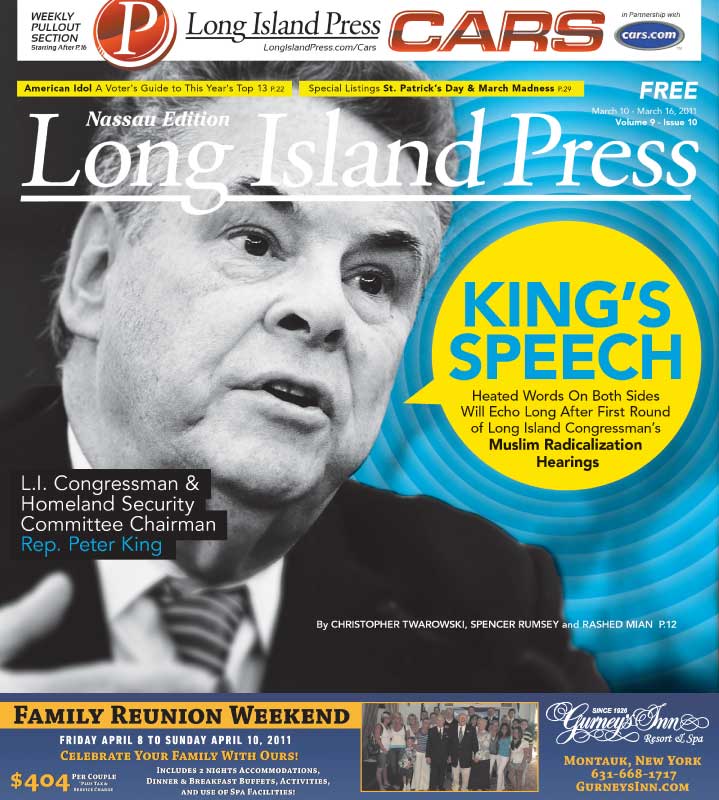
The Rocky Mountains are far from Robert Cole’s mind as he strides purposefully across the parking lot at Long Island Bus’s huge depot on Commercial Avenue in Garden City. With his sharp angular features, piercing gaze and earnest demeanor, the 56-year-old bus operator looks a bit like Gary Cooper about to corner some outlaw in an old cowboy Western instead of a veteran employee eager to speak his mind about the uncertain future of Nassau County’s transit system.
For almost 22 years, this Colorado native, a former cop in a Denver suburb, has been behind the wheel, picking up a portion of the 100,000 daily passengers that the Metropolitan Transportation Authority estimates ride the buses. On weekday afternoons, Cole drives the N22, which connects Roosevelt Field Mall to Jamaica Station and Hicksville. “Every one of my trips is jam-packed—all the 22s are like that,” he says.
Cole commutes to work from eastern Suffolk where he lives with his wife and two kids in Selden. (“It’s a hike,” he says.) He arrives early so he can enjoy a relaxing meal in the cafeteria. “I come here to eat!” Cole tells the Long Island Press, with a smile. “They’ve got some great teriyaki chicken right now.” When pressed, he admits that he misses the hunting and fishing of Colorado. But most of all, he says, “I miss seeing those mountains in the morning. The most majestic things you’ve ever seen!”
But what looms on the horizon these days for Long Island Bus union employees like him is a darker prospect—and for the present ridership it could be even gloomier. Come Jan. 1, 2012, thanks to Nassau County Executive Ed Mangano’s decision, the MTA, which has run the county’s bus service for 38 years, will be replaced by Veolia Transportation, a French-based company with American headquarters in Illinois that is one of the world’s largest private providers of transportation. Cole worries what will happen to his pension and his medical insurance going forward. He didn’t want to think about changing jobs, let alone consider early retirement, but now he’s starting to wonder whether he should drive a bus in New York City.
“This is very stressful,” Cole says. “I’m in a position where I’m damned if I do and damned if I don’t. I want to keep my medical benefits as they are.”
The effects on the ridership could be life-altering. Take a student like Francisco Cabrera, 21, who rides two buses to get to one math class at Nassau Community College. Any change in schedule or service and he says he’d probably have to stop going to school for a semester or more. On Sundays he says he takes three buses just to get to work. A middle-aged man with a lazy eye syndrome says he depends on the bus because he can’t legally drive. Another rider tells the Long Island Press he hasn’t driven a car in 20 years. Peggy Moise, a 28-year-old mother of two in Hempstead, says the decision to privatize is “not fair because of the mothers who don’t have the ways and means to get to work.” She says the politicians “are only thinking about themselves. They’re not thinking about people with low income. A cab can be crowded, and you can wait for an hour. They’re not looking out for us. They’re looking out for their own.”
Even before the terms of the agreement were announced (after months of secret negotiations between the bus company and the county executive’s office), Veolia had agreed with the Transport Workers Union Local 252 to give current employees priority and honor their seniority during the transition to a new operator. Complicating the situation, the county has said it will cut its subsidy from $9 million annually to $2.65 million, almost a tenth of what Suffolk contributes to its bus service ($25 million) and much less than the $30 million allocated by Westchester, which is roughly the same size as Nassau and already has a private bus company serving its residents.
Will the $2.25 fare have to rise in Nassau? Will routes have to be cut? Bus stops eliminated? Veolia has only promised to respect the status quo for a year. After that, how it makes a profit is anybody’s guess. And how long the county will be able to keep its subsidy so low is another question. The county legislature will hold one public hearing on the bus contract, the date still to be picked, and then vote on the deal: up or down.
“The county has an obligation to fund its transit system,” says Ryan Lynch of the Tri-State Transportation Campaign, a not-for-profit mass transit advocacy group based in Manhattan. “To think that it can fund its transit system on only two and a half million dollars a year is just unrealistic.”
Nassau County Presiding Officer Peter Schmitt (R-Massapequa) has a different take. He thinks the transit advocates are “not realistic. I mean, we have no money. I say it to them 16 times and they come back with: ‘But it’s only $26 million’ or ‘We can get by with $17 million.’”
“Ryan Lynch and Tri-State Transportation have been nothing but an advocate for the status quo, which taxpayers can no longer afford,” says Brian Nevin, spokesman for Mangano. “They’ve been an advocate for the MTA, which has wasted millions and millions of taxpayer dollars on bureaucracy in general.”
“This is another problem I have with the MTA,” says Schmitt. “They could not identify which routes have the heaviest ridership….I drive around the whole county a lot and probably 90 percent of the buses I see on the road are empty or have one or two people in them…”
Nevin said he’s sure that Nassau residents would support the new contract between the county and Veolia once they learn the details. [He expected to release the new agreement after we go to press.] “I’d rather have a contract that everybody knows is solid and efficient,” he says, “and that it delivers the services that riders expect and taxpayers can afford… We have eased anxiety for the taxpayer and that’s what matters in Nassau County.”
Veolia didn’t wait for the contract to be completed. As soon as it won the bid this spring, the company began laying the groundwork.
“[We] have been involved in learning every detail about Long Island Bus and the needs of its riders in order to plan for a smooth transition and successful future for the system,” said Mike Setzer, Veolia Transportation vice president and chief executive officer for the Nassau county bus system. “We intend to fill every available position with qualified employees from the existing workforce. Veolia respects and recognizes the excellent work of union members and believes they are integral to ensuring that we provide the best service possible for Nassau County.”
Whether Veolia can match that statement with reality will be tested soon enough. It’s held four meetings with current employees, including job fairs at the Uniondale Marriott.






